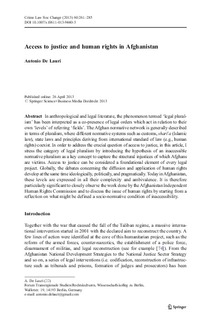Access to Justice and Human Rights in Afghanistan
Journal article, Peer reviewed
Permanent lenke
http://hdl.handle.net/11250/2475274Utgivelsesdato
2013-01-01Metadata
Vis full innførselSamlinger
- Publications [1488]
Sammendrag
In anthropological and legal literature, the phenomenon termed ‘legal pluralism’ has been interpreted as a co-presence of legal orders which act in relation to their own ‘levels’ of referring ‘fields’. The Afghan normative network is generally described in terms of pluralism, where different normative systems such as customs, shari’a (Islamic law), state laws and principles deriving from international standard of law (e.g., human rights) coexist. In order to address the crucial question of access to justice, in this article, I stress the category of legal pluralism by introducing the hypothesis of an inaccessible normative pluralism as a key concept to capture the structural injustices of which Afghans are victims. Access to justice can be considered a foundational element of every legal project. Globally, the debates concerning the diffusion and application of human rights develop at the same time ideologically, politically, and pragmatically. Today in Afghanistan, these levels are expressed in all their complexity and ambivalence. It is therefore particularly significant to closely observe the work done by the Afghanistan Independent Human Rights Commission and to discuss the issue of human rights by starting from a reflection on what might be defined a socio-normative condition of inaccessibility.
Serie
Journal of Crime, Law and Social Change vol. 60Journal of Crime, Law and Social Change vol. 60
Journal of Crime, Law and Social Change vol. 60 no. 3
